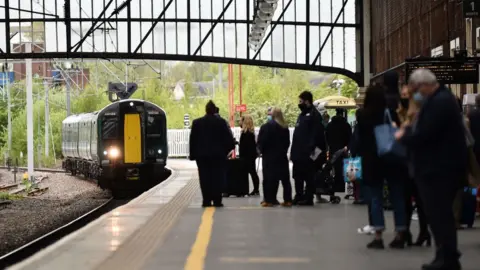Flexible ticket 'will only save me £7 a year' on my commute
 Getty Images
Getty ImagesThe introduction of flexible rail tickets - aimed at a growing number of commuters who only travel to the office two or three days a week - has had a muted response.
The Campaign for Better Transport said commuters will be "disappointed", while rail expert Tony Miles, of Modern Railways magazine, also had reservations.
But Transport Secretary Grant Shapps said the new tickets would offer "greater freedom and choice about how we travel, simpler ticketing and a fairer fare".
We asked regular train travellers for their first impressions.

'When I saw the numbers I was disappointed'
 Steve Allibone
Steve AlliboneSteve Allibone commutes from Worthing to London, where he works in financial services. An annual season ticket from West Worthing to London Bridge costs him £5,168. The flexible season ticket is £397 for 28 days, or £5,161 annually - meaning he would save £7 annually.
"In principle, it was quite a neat solution, but the cost and the pricing is a bit of a joke," he says.
Pre-Covid he was commuting five days a week and is currently going in one day a week, which will increase to two days a week after the restrictions ease.
"I could in theory save £400 if I only buy 12 of them, but that would require considerable planning when my weeks off are," he explains. When I saw the numbers I was disappointed."
He is also unimpressed with current service standards, noticing other passengers often having to stand for over an hour. Also, due to the frequency of train delays Mr Allibone was refunded £100 over the course of a year.
"The cost of the tickets has gone up and the quality of the service has gone down," he says.

'Secretly hoping for a better deal'
For Philippa, a project manager who moved to Bath from close to Stansted, Essex, during the pandemic, the new tickets fail to offer a sufficiently attractive saving.
Philippa, who did not want her surname used, works from home and misses the office. She does, though, have a "lovely work life balance".
"Before all this I was getting out of bed at 5.30 in the morning, coming back after work and going to bed and doing the same five days a week," she adds.
At the moment, her company is looking into a hybrid way of working, which would mean a couple of days a week in the office.
"I was hoping that I might be able to move to a couple of days a week in the office, enjoy London life and going out and things," Philippa explains.
To travel only two days out of seven would save Philippa only £17.60 a year, so she is still weighing up other options for reducing costs such as moving back closer to London.
"I was secretly hoping for a much better deal," she says.

How do the new tickets work?
- Digital flexi-tickets can be used on any eight days in a 28-day period England without being required to select the days of travel in advance
- They can be bought on rail websites and apps, as well as at some ticket offices
- Tickets are paperless, so travellers will have to use a smartphone or smartcard
- An online calculator will help passengers identify the cheapest option
- Until the end of this year, passengers who book in advance will be able to change their bookings with no extra charge
- The tickets are for standard class travel only

'Pretty appalling'
 Kate Morgan
Kate MorganKate Morgan, a management consultant in financial services, says her commute from Brighton to London, would be about 11% cheaper - £30 a month - with a new flexible ticket.
However, this reduction would be less than the cost of one day ticket, so any additional days required in the office would negate those savings. "Far from it being good news for commuters, it's pretty appalling," she says.
"People's point of reference is their annual season ticket, so it's not right for rail companies to compare savings with daily tickets," she adds.
For Ms Morgan, returning to the office for two days a week is going to cost about the same as it would for five days a week.
"The bit that I'm really disappointed in, is people have been working from home for 18 months and employers are in a difficult position - this really isn't helping that," she explains.
"It creates a real barrier in the way of that flexible working becoming a reality."

'Not a massive saving'
Niall McGregor, from Norwich, commutes to Canary Wharf to work in a bank. Before Covid he commuted twice a week and worked from home on the other days.
"When you look at the price per journey, the numbers don't make it sufficiently attractive," he explains.
His annual season ticket costs £8,884 for unlimited travel, whereas the Greater Anglia flexi ticket from Norwich to London would cost £682.30 - £8,187 a year - for only eight tickets a month.
"It doesn't feel like a massive saving for what you're giving up in terms of travel days," he says, because it means he would swap 20 days a month travel for eight days a month travel to save £697 a year.
"The maths of the new flexible season ticket just don't make much sense," he adds.

What do supporters say?
The government estimates commuters could save between £60 and £350 a year on selected journeys. Ministers say it might not be suitable for every commuter, but is tailored to the growing demand for more flexible working patterns.
The Department for Transport said: "Flexible season tickets will offer most 2 and 3 day per week commuters savings against buying daily tickets or traditional seasons."
"We have always been clear that passengers should consider which product best suits their journey and travel pattern."
And with the government planning a complete shake-up of the rail network, with the creation of Great British Railways, these changes could be just the start.
The Rail Delivery Group, which represents train operators said the rail companies would certainly like to go further in reforming the fares system to help commuters secure the best deal.
And the independent watchdog Transport Focus said the changes would help persuade people to choose rail travel again.
"Our research with passengers showed us there was strong demand for a new ticket that suited people who expected to commute less frequently in future," the group said.
